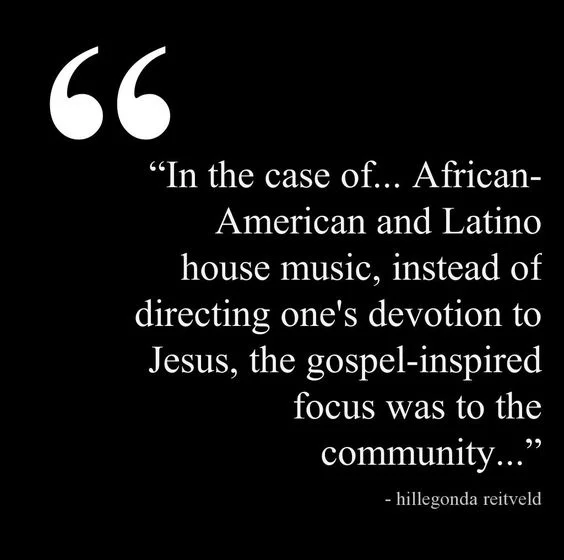The Problem Of Intention
Throughout the course of this project one issue seems to pervade the material or, rather, how I attempt to interpret the material Chicago house and garage house music presents. The issue that surrounds this project particularly is just what the intention was behind the material when it was created. I find myself constantly trying to reason which direction the material comes from. Did they mean what they say? Or was it subverting that meaning? Or is it a double bluff?! Let me explain...
If we take Mr Fingers' Can You Feel It? as an example this feels relatively easy to understand and contextualise (I'm aware this is the 1988 re-release). The preacher-style vocal tells the listener/dancer an altered version of the genesis creation story, except in this story God has been replaced by Jack or the spirit of house music. It's clearly a play on the biblical story in a track that simultaneously subverts the original story and cannibalises it to work with the inherent cultural power that story carries. By referencing genesis so obviously (Let there be light vs. Let there be house) and twisting it in the manner it does, it can't really be an attempt to preach christian values to a dancefloor full of jackers.
In this instance there aren't particularly big issues with intention or directionality. It comes from a place that is clearly using christian-style language in a pastiche to say something very different than the original reference material.
Similarly in Michelle Weeks' The Light we're presented with the exact opposite situation. The language is so acutely and accurately christian it isn't subverting the material at all. In this instance this track appears to be a concerted attempt to specifically minister a christian message to the crowd. Like Mr Fingers, this track is pretty clear in it's intention; but it comes from a place of sincere religious belief.
It's arguable that some level of subversion is occurring here but this time from the opposite direction to Mr Fingers. Whereas Mr Fingers subverts biblical stories and converts them into secular myths about a music scene, Michelle Weeks is subverting the secular musical form as a carrier for a christian message. It represents a change in direction but intention remains (albeit inverted).
However, there are many tracks where that directionality or intention is nowhere near as clean cut (such as The Absolute's I Believe). Stylistically they reference christian gospel, using gospel style choirs and vocals, organs, funky electric bass lines and specific harmonies. And lyrically they appear to be closer to the sincere, religious perspective of the likes of Michelle Weeks. Yet they stop short of being overtly liturgical in their language. These pieces occupy this difficult area. I think of it as a no-mans land between two opposing forces; one of belief and one of reference.
It's likely this occurs for several reasons. Either the musicians simply reference the style of tracks gone before in an attempt to place themselves stylistically in the genre they want where these ideas are part of the overall language/style of house music, OR they feel the are unable to push that boundary as far as they'd like into a realm of christianity. But both of these seem somewhat like lazy, reductivist logic.
from This is Our House: House Music, Cultural Spaces, and Technologies, 1998
At these pinch points of the discussion Reitveld (1998) offers an escape route. Rather than attempting to draw a dividing line between the two camps, it's feasible that a third position may present a potential answer. During the 80s and 90s there is very little discussion of God or Jesus by name in the music (I've only found one example before 2000 where the word Jesus is actually said). Maybe a christian God doesn't have to exist in the music, as long as some form of worship to some force is present in some way. Reitveld appears to support this. Perhaps God has been replaced by the house music community, or even by the music itself.
Finally, it may even be that these type of lyrics only exist because they are now a convention of the genre, or a trope that must be adhered to. Perhaps the notion of belief and striving for a better tomorrow (as seen in The Absolute track) are now so thematically embedded in house music that no one really considers where they come from or what the function of them is. Maybe "keep on pushing" "believe in yourself" "have faith" and "take me higher" are now meaningless because of constant repetition. Ritual and religion by their very nature are rooted in repetition (Rappaport, 1999). This would certainly support the notion that the music is now the focal point of worship, rather than any particular deity. This concept is discussed in much more details in Do You Believe?.
There are no hard or fast rules that we can apply to this problem; each track, each performer, each lyric must be looked at and analysed on it's own merits, and somehow contextualised as to how it fits into the whole. That being said it's certain that music coming out of labels like Defected in the later years, and especially from Jamie Lewis and Purple Music do tend to have a stronger christian ethos underpinning them, and more readily sit alongside Michelle Weeks than Mr Fingers. Yet the space between remains unmapped. Reitveld offers us some room to manoeuvre but also presents a new difficulty in identifying a new kind of spirituality that surrounds modern house music without the need for prescribed Gods. If, in our discussion, Mr Fingers is an atheist, and Michelle Weeks is a confirmed christian, then Reitveld suggests some new middle-way of musical agnosticism.






